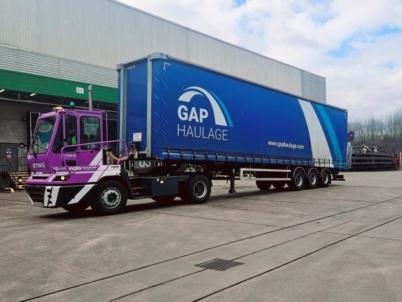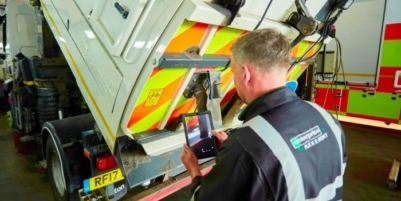-
Nutrivend selects Forterro’s Orderwise to support online expansion and streamline operations - April 11, 2025
-
ARROWXL LAUNCHES AMBITIOUS ZERO WASTE ROADMAP - April 8, 2025
-
THE BCMPA’S NEW CAMPAIGN DRIVES OUTSOURCING SUCCESS IN Q1 - April 7, 2025
-
BLACKOUT TECHNOLOGIES TARGETS TELEMATICS-INTEGRATED MOBILE DEVICE BLOCKING TO COMBAT SMARTPHONE DISTRACTION - April 1, 2025
-
OpenADR Alliance announces first OpenADR 3.0 certified products with EVoke Systems, E.ON Energy and Universal Devices - March 25, 2025
-
Growing fulfilment and contract packer appoints new Managing Director - March 25, 2025
-
When is it time to invest in a WMS? Understanding the key trigger points - March 25, 2025
-
eCapital helps Vantage Recruitment on its journey to financial success - March 24, 2025
-
Hugo Beck Celebrates 70 Years of Packaging Innovation with Open House Events - March 20, 2025
-
PROLOG FULFILMENT SUPPORTS LUNA DAILY’S COMMITMENT TO BETTER BODY CARE FOR ALL WOMEN - March 19, 2025
New research from Alphabet (GB) has revealed a third (33%) of fleet managers have little to no knowledge of corporate duty of care to employees that drive company-owned or leased vehicles. Less than half (45%) considered themselves very knowledgeable on the topic and while the majority conduct regular driver risk policy reviews (81%), there is still a proportion of businesses that don’t have a driver risk policy in place at all (4%) or haven’t reviewed their policy in the last 12 months (15%).
All businesses have a legal duty to actively manage health and safety in the workplace and ensure they have policies and procedures in place to reduce work-related risk to both employees and members of the public. When travelling for business, vehicles are considered a place of work and must be well-maintained, taxed, insured, hold a current MOT, and be ‘fit for purpose’. Businesses should also conduct regular driving licence checks, risk assessments, and training to help manage and reduce driver risk. Overlooking aspects of duty of care or not keeping adequate records can have significant legal, financial, and reputational consequences.
When asked about driving training and accident management, encouragingly the vast majority of fleet managers said they have a driver training programme in place (88%). However, 12% of businesses with fleets larger than six vehicles said they did not conduct any form of driver training and a further 10% offered training less than annually, meaning new starters are likely to miss out on vital knowledge. Similarly, while most fleet managers said they keep records of accidents that take place in all vehicles on business travel, rather concerningly, 8% of respondents said they do not record details of accidents involving company vehicles and the figure doubled to 16% for private vehicles.
Alphabet’s latest research also found that while 43% of businesses have seen an uplift in the number of employees using private vehicles for business travel post-pandemic, 51% of UK fleet managers still don’t consider themselves as having a good understanding of duty of care responsibilities for their ‘grey fleet’ population. This knowledge gap is further reflected by the fact that nearly a third of fleet managers said their business doesn’t have a risk management policy in place that covers all employees, regardless of whether they are driving company or private vehicles.
“If a business requires its employees to use vehicles for work, it’s critical fleet managers, drivers, and the wider organisation, understand and mitigate the risks associated with occupational driving. Driver risk must be correctly managed to ensure duty of care and legal obligations under the Health and Safety at Work Act 1974, Road Traffic Act 1988, and the Corporate Manslaughter and Corporate Homicide Act 2007 are met,” commented Gavin Davies, General Manager, Customer Account Management at Alphabet.
“However, our research shows there are some vital gaps when it comes to understanding and meeting duty of care responsibilities when employees are driving on company business. Far too many employers are still unaware that they retain responsibility for their employees’ safety and conduct when they’re travelling for work purposes, even if they’re using their own car. This is particularly concerning given the increase in private vehicle use that 43% of fleets managers have observed since the pandemic, as these vehicles are often older, not as regularly maintained, and much easier to overlook than company vehicles. It’s clear fleet managers need to prioritise risk management, whether that’s seeking external advice or bringing in an experienced partner to manage the full process for them. A robust and proactive driver risk strategy will not only help businesses better understand and manage potential risk, it can also reduce fleet running costs and downtime.”
To help fleet managers feel empowered and identify areas for improvement, Alphabet has shared its ‘Driver Risk Essentials checklist’ to highlight some of the necessary assessments and measures required to manage the risks of vehicle-related operations.
Driver Risk Essentials checklist:
Complete comprehensive checks regularly
- Driving licence: Ensure all drivers hold a valid UK driving licence for the right category of vehicle they are driving
- Employee audit: Check employees are fit to drive i.e. consider things like eyesight, medical fitness, right to work, accident records, disqualifications or conditions on their licence
- Mileage: Understand how far your drivers are travelling each year and complete risk assessments
- Private vehicle insurance: Make sure drivers using private vehicles are aware of their responsibility to insure their vehicle for business travel, not just commuting
Provide driver training
- Regularly assess drivers and provide training online and in person, as well as practical training where needed
- Review your driver risk policy and ensure all employees are aware of the policy and their own responsibilities to promote a safety-conscious culture
Regular vehicle servicing and maintenance
- Ensure all vehicles used for business travel are roadworthy and fit for purpose to protect drivers, other road users and the environment
- Carry out frequent checks and keep detailed records of insurance, MOT, and road tax, for privately owned vehicles used for work purposes
Good record keeping and retention
- Keep detailed records and signed documentation from drivers. An audit trail will help ensure nothing gets overlooked and evidence appropriate policies and procedures are in place
Gavin Davies, continued: “We understand the risks associated with fleet management and our comprehensive driver risk management solution is designed to offer customers peace of mind, so they can focus more time on driving their business forward. Our in-house experts are dedicated to making mobility easy for our customers and are on hand to support and offer guidance to fleet managers and drivers, helping them to make informed decisions, and take corrective action when required to ensure all journeys are made in a safe and responsible manner.”
For more information on Alphabet’s Driver Risk Management Solution, visit https://www.alphabet.com/en-gb/driver-risk-management

































